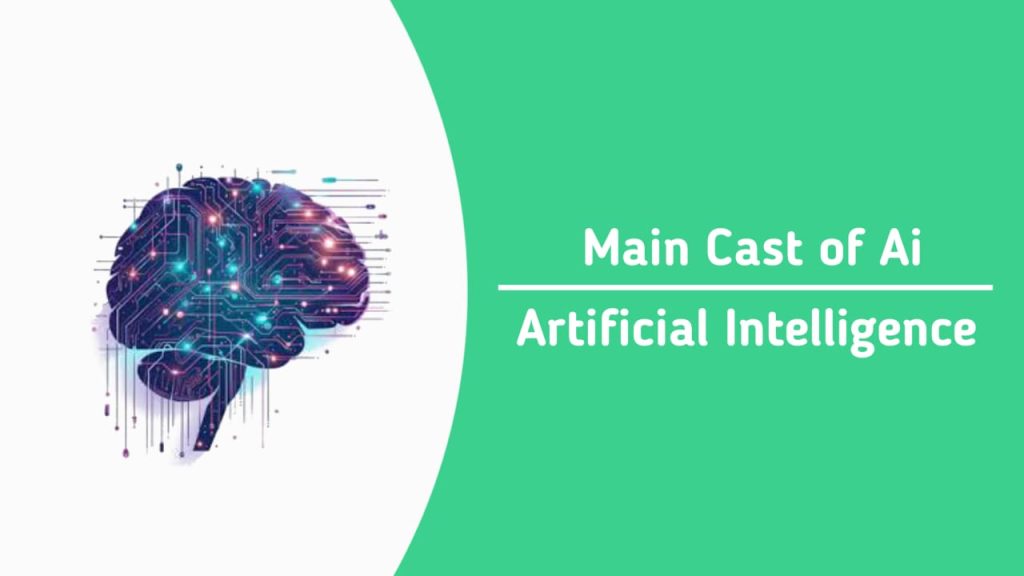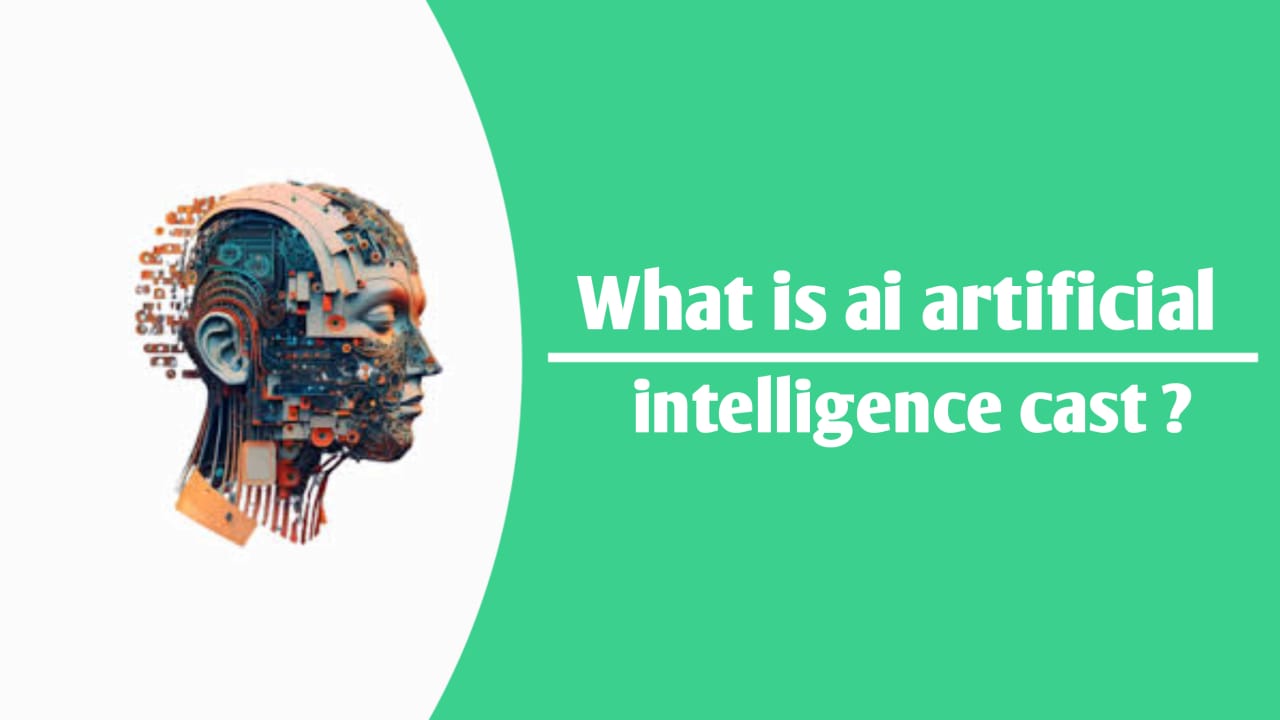Table of Contents
Introduction
Artificial intelligence (AI) has become one of the most transformative technologies in the 21st century, but its cinematic representation has captivated audiences long before AI became part of our daily lives. One of the seminal movies to depict AI is AI: Artificial Intelligence (2001), a film directed by Steven Spielberg, based on an idea by Stanley Kubrick. The movie’s exploration of AI, robots, and humanity has left an indelible mark on the science fiction genre, and its cast brought these themes to life.
In this article, we will provide a detailed look at the AI: Artificial Intelligence cast, its impact on the narrative, and how this iconic film has contributed to shaping the conversation around AI.
What is ai artificial intelligence cast
“AI: Artificial Intelligence” is a 2001 science fiction film directed by Steven Spielberg. The movie is set in a future where robots with advanced artificial intelligence are integrated into society. It stars Haley Joel Osment as a child-like robot named David who is programmed to love unconditionally. The film explores themes of humanity, emotion, and the ethics of artificial intelligence.
- The main cast includes:
- Haley Joel Osment as David
- Jude Law as Gigolo Joe
- Frances O’Connor as Monica Swinton
- Sam Robards as Henry Swinton
- William Hurt as Professor Allen Hobby
- Brenda Blethyn as Mrs. Swinton
The film combines elements of fairy tales and futuristic science fiction, with Spielberg’s signature storytelling style.
Overview of AI: Artificial Intelligence (2001)
Released in 2001, AI: Artificial Intelligence is a science fiction film set in a dystopian future where humanity coexists with highly advanced robots called Mechas. These robots have been designed for various purposes, from household tasks to more advanced roles, such as fulfilling emotional needs. The central storyline revolves around a highly advanced child robot, David, who is programmed to love and seeks to become “real” in order to gain the love of his human mother.
The movie delves deep into complex themes of love, humanity, and the ethical dilemmas of artificial intelligence, making it not just a futuristic story but also a profound exploration of human emotions and identity.
The Vision of Stanley Kubrick and Steven Spielberg
- The journey of AI: Artificial Intelligence from concept to completion is a unique one. Stanley Kubrick, known for his visionary filmmaking in classics such as 2001: A Space Odyssey and A Clockwork Orange, initially conceived the project in the early 1970s. However, Kubrick believed that the technology of the time was insufficient to bring his vision to life, particularly in terms of creating a believable robotic child character. Consequently, Kubrick shelved the project for years.
- After Kubrick’s death in 1999, Steven Spielberg, who had a long-standing admiration for Kubrick’s work, took up the project. Spielberg wrote the screenplay based on a treatment by Kubrick and melded Kubrick’s darker, philosophical tone with his own storytelling style, known for its emotional depth and warmth. The result is a film that balances existential questions with a deeply personal, emotionally charged narrative.
Main Cast of AI: Artificial Intelligence

One of the most compelling aspects of AI: Artificial Intelligence is its cast, whose performances bring the movie’s futuristic world to life. The actors contribute significantly to the film’s emotional depth and the exploration of its central themes, particularly the relationship between humans and AI.
Haley Joel Osment as David
Haley Joel Osment, a child actor already famous for his role in The Sixth Sense (1999), plays David, the robot boy at the heart of the story. His portrayal of a Mecha who feels love and desires to become human is both haunting and heartbreaking. Osment masterfully conveys innocence and determination, showing David’s journey from an unconditionally loving robot to a tragic figure grappling with the limitations of his artificial nature.
Osment’s performance in the film is highly praised, as he convincingly depicts David’s growing emotional complexity, from his unflinching love for his adoptive mother to his intense desire to be “real.” This duality is central to the film’s exploration of AI—David is programmed to love, but his experience of emotions goes far beyond his programming.
Jude Law as Gigolo Joe
Jude Law plays Gigolo Joe, a Mecha designed for adult companionship. Unlike David, Joe is fully aware of his artificial nature, yet his character is one of the film’s most charismatic figures. His flamboyant and confident demeanor contrasts sharply with David’s innocence. Despite being programmed for pleasure, Joe’s character provides a lot of the film’s commentary on what it means to be human, particularly regarding love, purpose, and survival.
Law’s performance was widely acclaimed for its charm and depth. He offers a performance that brings a sense of style and vulnerability to a character that could have easily been one-dimensional.
Frances O’Connor as Monica Swinton
Frances O’Connor plays Monica Swinton, David’s adoptive mother, whose complex emotions drive much of the film’s early drama. Initially, Monica is a grieving mother unable to cope with the illness of her biological son. She later forms a bond with David, only to abandon him when her real son recovers. O’Connor’s portrayal captures the heartbreaking dilemma faced by humans in the movie’s world: the struggle to love something artificial as if it were human.
O’Connor’s nuanced performance helps ground the film’s more speculative elements in a deeply human story, exploring themes of maternal love, loss, and moral ambiguity.
Sam Robards as Henry Swinton
Sam Robards plays Henry Swinton, Monica’s husband and David’s adoptive father. Henry is responsible for bringing David into their home, but unlike Monica, he is more detached from David and sees him as a product of technology rather than a true son. Robards’ performance provides a pragmatic counterpoint to the emotional turmoil Monica experiences, embodying society’s conflicted view of AI—useful yet inhuman.
William Hurt as Professor Hobby
William Hurt plays Professor Hobby, the scientist behind the creation of David. Professor Hobby represents the ambitious, almost godlike figure who sees AI as the next step in human evolution. Hurt’s portrayal is cool and cerebral, underscoring the ethical and philosophical questions at the heart of the movie. His character embodies the tension between scientific progress and moral responsibility, serving as a catalyst for David’s quest to become “real.”
Supporting Cast and Their Roles
While the main cast anchors the film, several supporting characters add layers of depth and meaning to the narrative.
Brendan Gleeson as Lord Johnson-Johnson
Brendan Gleeson plays Lord Johnson-Johnson, the leader of the Flesh Fair, where rogue or obsolete robots are destroyed for entertainment. His character is a symbol of humanity’s darker side, showcasing the fear and hostility towards AI. Gleeson’s menacing performance highlights the film’s exploration of the ethical treatment of sentient machines.
Robin Williams as Dr. Know (Voice)
Robin Williams provides the voice for Dr. Know, an AI character designed to answer any question posed to it. Dr. Know serves as both a plot device and a symbol of humanity’s dependence on AI for knowledge. Williams’ whimsical, fast-talking delivery adds a touch of humor and irony to the character, further emphasizing the film’s critique of how AI is used by humans.
Ben Kingsley as Narrator (Voice of The Specialist)
Ben Kingsley lends his voice to the character of The Specialist, who narrates the final act of the movie. His calm, authoritative voice adds a layer of gravitas to the film’s conclusion, where future robots, or “Super Mechas,” continue to exist long after humanity has become extinct.
Meryl Streep as Blue Fairy (Voice)
Meryl Streep voices the Blue Fairy, a character from the Pinocchio story that David believes can make him “real.” Streep’s soothing, almost ethereal voice adds a magical quality to the character, making her a symbol of David’s hope and the unattainable nature of his dream to become human.
AI: Artificial Intelligence’s Exploration of Human-Android Relationships
- One of the most striking aspects of AI: Artificial Intelligence is its portrayal of human-android relationships. The movie raises questions about whether a robot can truly feel emotions, and whether humans can, in turn, genuinely love something artificial. The cast’s performances, particularly Osment’s portrayal of David, allow the audience to engage with these questions on a deeply emotional level.
- David’s journey is essentially a quest for love and acceptance, a theme that resonates with viewers and adds depth to the depiction of AI. The movie suggests that while AI can mimic human emotions, there is something uniquely human about the experience of love, loss, and desire.
Cinematic Influence of the AI: Artificial Intelligence Cast
- The cast of AI: Artificial Intelligence played a pivotal role in the movie’s success and its lasting impact on cinema. Haley Joel Osment’s performance as David was groundbreaking in its ability to evoke empathy for an artificial being, challenging audiences to reconsider their preconceived notions about AI.
- Jude Law’s portrayal of Gigolo Joe brought a sense of charisma and complexity to the film, making it one of the few movies to explore the concept of AI-created pleasure in a nuanced way. Frances O’Connor, William Hurt, and the rest of the cast helped ground the film’s futuristic narrative in emotional realism, which contributed to its universal appeal.
The Role of AI in Modern Cinema: A Legacy of AI: Artificial Intelligence
Since its release, AI: Artificial Intelligence has become a touchstone for how AI is depicted in film. Its exploration of emotional intelligence, ethical questions, and human-robot relationships has influenced numerous films, such as Her (2013) and Ex Machina (2014). The movie’s depiction of AI as both a technological marvel and a potential threat continues to resonate in today’s discussions about the future of AI.
Conclusion: The Lasting Impact of the AI: Artificial Intelligence Cast and the Film on AI Culture
AI: Artificial Intelligence remains a seminal film in the science fiction genre, largely due to the exceptional performances of its cast. Through their portrayals, the film delves into the complex relationships between humans and AI, raising questions about love, identity, and the future of technology. The cast’s performances, combined with Spielberg’s visionary direction, have left a lasting legacy in both cinema and the broader cultural conversation about artificial intelligence.
By exploring the themes and characters in AI: Artificial Intelligence, it’s clear that the film’s depiction of AI is as much about humanity as it is about machines. The exceptional performances of the cast brought these ideas to life, making the film a timeless exploration of love, loss, and the quest for identity in an increasingly technological world.
